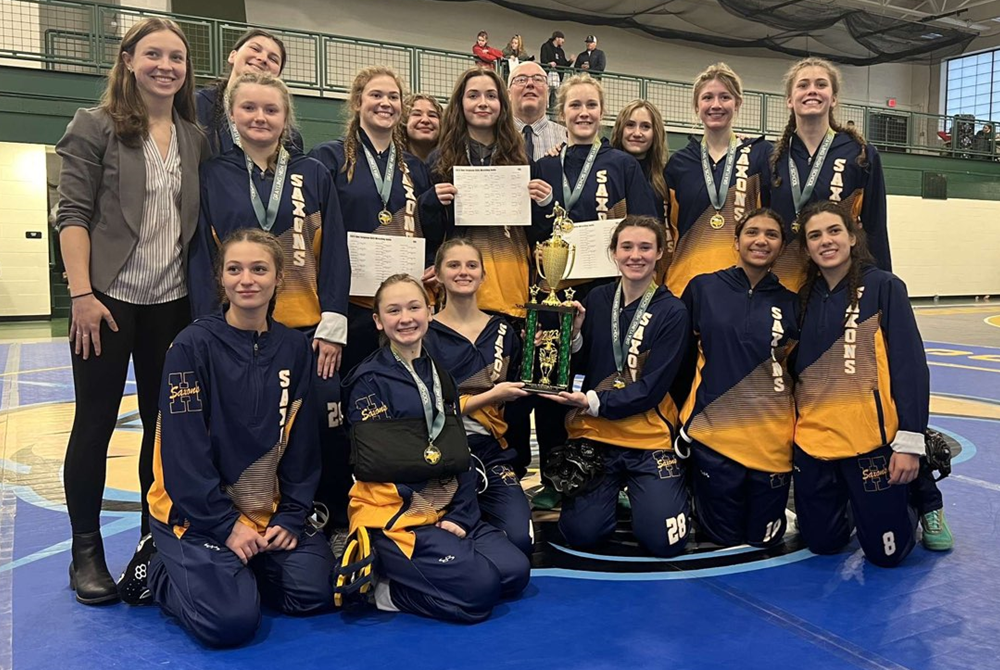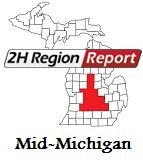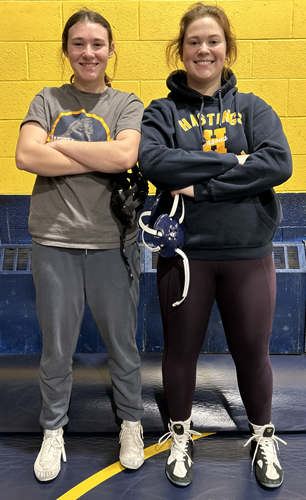
Rep Council Wrap-Up: Winter 2015
April 1, 2015
By Geoff Kimmerly
Second Half editor
The selection of a new venue for its Team Wrestling Finals highlighted actions taken by the Representative Council of the Michigan High School Athletic Association during its annual Winter Meeting on March 27 in East Lansing.
The Team Wrestling Finals will be hosted by McGuirk Arena at Central Michigan University in Mount Pleasant for two years beginning with the 2016 tournament. The Team Wrestling Finals previously had been hosted by Kellogg Arena in Battle Creek since their inception in 1988.
McGuirk, formerly Rose Arena, is part of the CMU Events Center and reopened in 2010 after the facility underwent $22.5 million in renovations. McGuirk seats 4,867 fans for wrestling competitions, and the building also features adjacent practice areas that will be utilized by teams competing at the MHSAA Finals.
Rose Arena formerly served as host of the MHSAA Girls Basketball Finals from 1997-2003.
“We are grateful to the athletic directors, staff and volunteers whose time and energy factored heavily into creating and growing the Team Wrestling Finals at Kellogg Arena,” MHSAA Executive Director John E. “Jack” Roberts said. “The decision to move from Battle Creek was not an easy one. However, we believe Central Michigan University offers us a fantastic opportunity to continue growing one of our most popular championship events.”
The Representative Council also continued discussions on three issues which may require action at meetings later this calendar year.
Continuing its examination of athletics at the junior high/middle school level, the Council discussed recommendations submitted by the MHSAA’s Junior High/Middle School Committee, including one which may come up for vote at the Council’s May meeting. It is a request for a membership vote to amend the MHSAA Constitution to allow for school membership beginning at the 6th grade. If the Council approves, the amendment vote likely would occur in late October after another round of membership meetings.
The Council also continued its discussion of potential changes to out-of-season coaching rules and considered results of surveys taken during the MHSAA’s Update Meetings in the fall and by athletic directors and leaders of leagues and conferences during the late fall and winter. The major changes in rules that were proposed for discussion last summer have not gained traction with the MHSAA membership, but three modifications intended to give school coaches longer and more flexible contact with their student-athletes out of season during the school year will receive Council action in May.
Continuing its work regarding the eligibility of international students, the Council also approved that MHSAA staff continue reviewing school-operated international student programs for the purpose of granting students athletic eligibility at MHSAA schools. A proposal first approved at the March 2014 meeting granted the MHSAA authority to grant athletic eligibility to students placed through an Approved International Student Program that had not been accepted for listing by the Council on Standards for International Educational Travel (CSIET), so long as that Approved International Student Program is not eligible for CSIET consideration and listing. CSIET will only review existing programs, but the MHSAA’s supplemental process will allow programs too new for the CSIET process to gain approval for 2015-16.
Those international students placed through an Approved International Student Program are eligible for a maximum of the first two consecutive semesters or three consecutive trimesters at any secondary school in the United States, after which the student is ineligible for interscholastic athletic competition at any MHSAA member school for the next academic year. International students who do not meet one of the residency exceptions recognized by the MHSAA or are not enrolled through an Approved International Student Program or CSIET-listed program may become eligible after one semester to participate at the subvarsity level only.
The Representative Council is the legislative body of the MHSAA. All but five members are elected by member schools. Four members are appointed by the Council to facilitate representation of females and minorities, and the 19th position is occupied by the Superintendent of Public Instruction or designee.
The MHSAA is a private, not-for-profit corporation of voluntary membership by more than 1,400 public and private senior high schools and junior high/middle schools which exists to develop common rules for athletic eligibility and competition. No government funds or tax dollars support the MHSAA, which was the first such association nationally to not accept membership dues or tournament entry fees from schools. Member schools which enforce these rules are permitted to participate in MHSAA tournaments, which attract more than 1.4 million spectators each year.

Hastings Among Statewide Pacesetters as Girls Wrestling Enjoys Rapid Growth
By
Steve Vedder
Special for MHSAA.com
January 12, 2024
Sophia Sunior thought the mat might be the perfect place to learn something new about herself.
 So after hanging around a handful of Hastings boys wrestling practices a year ago, the Saxons senior opted to join the school's fledging girls team. As a former swimmer and current softball player, Sunior considered herself competitive. But the real attraction to wrestling, said Sunior, was to test her own mental and physical boundaries.
So after hanging around a handful of Hastings boys wrestling practices a year ago, the Saxons senior opted to join the school's fledging girls team. As a former swimmer and current softball player, Sunior considered herself competitive. But the real attraction to wrestling, said Sunior, was to test her own mental and physical boundaries.
At first, Sunior struggled with the decision as she met with little success against more experienced wrestlers. But little by little, Sunior began to improve. And that's when she began to discover critical pieces about herself.
"For me, a lot of it was mental," Sunior said. "But I became stronger mentally and physically. Wrestling is probably one of hardest sports there is. It's almost legalized fighting, and I've learned so much about myself. My motto is if I can wrestle, I can do anything. You can learn some of the best (teaching) tools about yourself you can get."
While Sunior started last season slowly, she finished with a bang, placing eighth at MHSAA Individual Finals at 190 pounds. She's started this season with seven wins over her first eight matches.
Sunior is part of what Hastings coach Mike Goggins believes is the largest girls wrestling team in the state with 16 athletes. Goggins, who coached the Hastings boys team for 38 years, switched over to the girls program two years ago. Hastings had five Finals qualifiers and three placers last season.
Goggins isn't necessarily surprised that girls wrestling has caught on at Hastings, which has long had a quality boys program with Goggins' teams winning 11 league championships, 10 Districts and one Regional title and totaling 28 Individual Finals placers under his guidance.
The ability to build a program has carried over to the girls. The team had 14 wrestlers a year ago, and this season’s competitors have come from a variety of backgrounds. Of the 16 total, seven are first-year wrestlers. Three are first-year varsity letter winners, while two play basketball, two tennis, two softball, and one is a volleyball player.
“It's really kind of taken off," Goggins said of the sport. "A lot of the girls had shown interest in boys wrestling, and then when we offered wrestling for the girls, we began to get numbers. I'm not terribly surprised by that. Just the experience of what the girls saw with the boys, I just think they wanted an opportunity."
 MHSAA participation surveys show 100-150 girls regularly participating in wrestling during the end of the first decade of the 2000s, but numbers began growing substantially to match the introduction of a state individual tournament by the Michigan Wrestling Association (the state coaches association) during the 2018-19 season and then the addition of a girls-only division to the MHSAA Individual Finals in 2022. Goggins said the vast majority of girls would much rather compete against girls. “I'd say 10 to 12 of our wrestlers will say no thanks to wrestling against boys, and that's absolutely fine,” he said.
MHSAA participation surveys show 100-150 girls regularly participating in wrestling during the end of the first decade of the 2000s, but numbers began growing substantially to match the introduction of a state individual tournament by the Michigan Wrestling Association (the state coaches association) during the 2018-19 season and then the addition of a girls-only division to the MHSAA Individual Finals in 2022. Goggins said the vast majority of girls would much rather compete against girls. “I'd say 10 to 12 of our wrestlers will say no thanks to wrestling against boys, and that's absolutely fine,” he said.
MHSAA assistant director Dan Hutcheson noted girls wrestling has nearly tripled from 495 athletes who completed an Alpha weigh-in in 2019-20 to 1,332 this winter.
"The goal is we hope it keeps growing to where schools have complete lineups," Hutcheson said. "Wrestling is a sport you can do on your own and if you put in the work, you can be successful.
"We don't know how or to what point it grows, but it's been at a nice clip."
Goggins said the sport's next hurdle indeed will be fielding enough teams for dual meets. Hastings has gone to three tournaments, which included plenty of travel to East Jackson, Grayling and Montague. The Montague event had 52 competitors, but weekend tournaments can be a numbers struggle as most teams are never able to field a complete lineup. That leaves organizers with the challenge of organizing brackets to fit the participants.
When there are enough girls for more teams to fill the standard 14 weight classes, the sport will likely grow even more, Goggins contends.
One of his first decisions as girls coach was to hire a female assistant in his daughter, Erin Slaughter, also the school's volleyball coach. Goggins, the school's athletic director, said the move means girls don't have to turn to a male coach for advice. "It's added a certain comfort level," he said.
While Sunior is one of the most experienced wrestlers, first-year senior Skylar Fenstemaker said she has her own reasons for joining the program.
"It's a challenge," she said. "Just the physical commitment and how hard (you) have to work. And I wrestle because I like being part of a team and the bond you have with the other girls. You learn that you have to work hard to get what you want."
PHOTOS (Top) The Hastings girls wrestling team celebrates its team championship at the Grayling Invitational this season. (Middle) First-year wrestler Skylar Fenstemaker, left, and returning Finals placer Sophia Sunior are two of 16 athletes on the team. (Photos courtesy of the Hastings girls wrestling program.)

